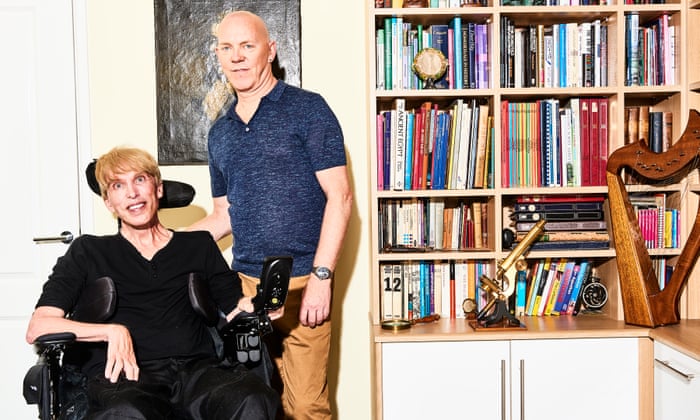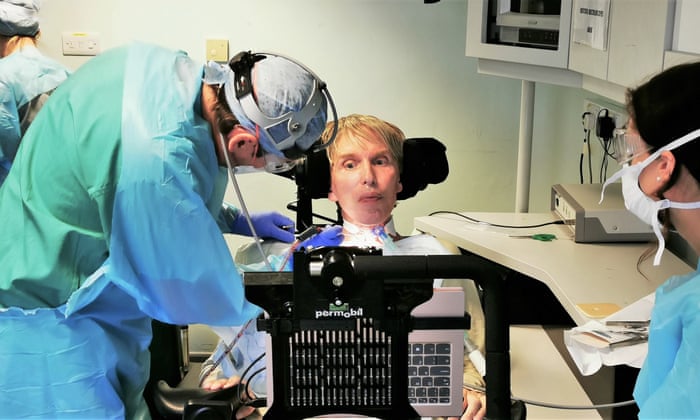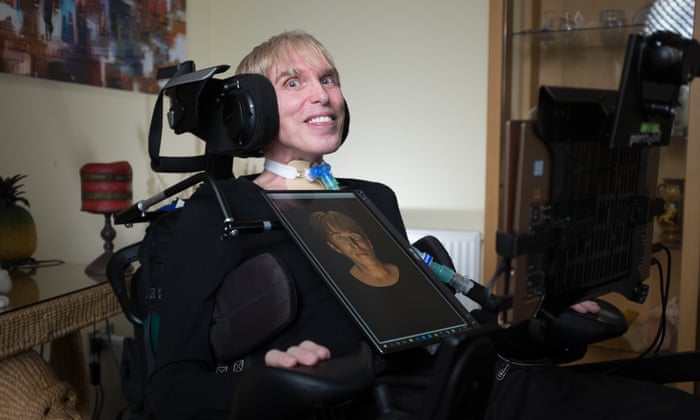"Quite Extraordinary. It really Is."
"Good. Grief. I was unprepared for the emotion ... It's quite extraordinary. It really is." "Think of it as a science experiment. This is cyborg territory, and I intend to be a human guinea pig to see just how far we can turn science fiction into reality." "In a rather perverse way the future looks like it's going to be rather exciting. In a 'boys with their toys' sort of a way, potentially even a bit fun." "When I email people who are locked in [through motor neuron disease], they say of all the faculties that they lost, speech was the worst, the most traumatic, the one that made them feel most disabled." "It is impossible, even if they use text-to-speech ... They are not able to communicate their emotion." "Growing up openly gay in the 70s taught me to think for yourself. I got very used to not feeling that I had to fit, because for a long time the world was telling me [I] really, really didn't fit." "After 40 years of breaking the rules, I'm still saying, 'let's not do it the way it's done before, let's do something different'." Peter Scott-Morgan, 62, British scientist, Torquay, South Devon
"You can't help but be impressed by the way he wants to take control." "I think this is groundbreaking and he is a pioneer." Marie Wright, anesthesiologist
 |
| ‘I’m just getting started’: Peter Scott-Morgan with his husband Francis. Photograph: Tom Jackson/The Observer |
In 2017, British scientist Peter Scott-Morgan, 62, faced the challenge of his life when he was diagnosed with motor neuron disease, an incurable condition that would eventually freeze all of his physical capabilities, as it progressively destroys his motor neurons; walking, breathing, speaking, and swallowing would all eventually be compromised and he would become physically helpless; a sound mind in a destroyed body.
The process whereby signals from nerve cells in the brain transmit to cells in the brain stem and spinal cord and then on to muscles where upper motor neurons direct lower motor neurons to produce muscle movements dissipates, since when muscles no longer receive signals they weaken and deteriorate. No longer receiving signals from upper to lower motor neurons can lead to muscle stiffness (spasticity) and overactive reflexes, so voluntary movements become slow and difficult to the point where eventually walking or movement controls are absent.
This man with his master's in artificial intelligence and doctorate in robotics is determined to discover methods which would allow himself first and eventually others afflicted with MND to live after becoming "locked-in"; their minds alert, their bodies immovable. As far as he is concerned, Peter Scott-Morgan is on the way to becoming a new version of himself. He sees himself as a pioneer innovator paving the future for a breed of humans augmenting physical incapacity with the use of technology.
He envisions an exoskeleton encasing his upper body, allowing him superhuman strength -- with a mind-reading computer plugged directly into his brain to express his thoughts instantly, his paralyzed face replaced with a hyper-realistic avatar moving in time with a speech synthesizer. To that end, radical body alterations have already occurred. He "re-plumbed" his stomach in 2018, with three separate, high-risk surgeries; to insert a feeding tube into his stomach, a catheter in his bladder; a colostomy bag on his colon.
 |
| We can make things better for everyone with a disability’: undergoing research. Photograph: Channel 4 |
Each of those surgical procedures came with risks that might result in an acceleration of the MND progress. He had his esophagus and trachea separated last year through a laryngectomy to prevent saliva running into his lungs as paralysis moved toward his chest and throat. The process threatened the loss of his voice and its distinctiveness. A loss he feared and addressed by recording words and sentences -- assisted by scientists at Edinburgh-based CereProc. Recordings used to create a synthetic voice, sounding remarkably like his original.
A photo-realistic virtual avatar was designed to move its lips in synchrony with his speech, to provide facial expressions like laughter and surprise, coinciding with the conversation. The aid of the director of Anticipatory Computing at Imtel Labs, Lama Nachman helped to develop a plan to build the cyborg that would become Scott-Morgan with its own artificial intelligence. He would rely on the AI to provide instant response, the machine speaking for itself utilizing phrases learned from Scott-Morgan.
"I knew that with some focused hi-tech research it was quite possible to transform what it meant to have MND and if I took the right precautions then, rather than in two years, I had a good chance of living for another couple of decades." "I envisioned what realistically, with the right encouragement, could be done to change what it means to have extreme disability. Then I worked backwards to work out what would come first." Peter Scott-Morgan
 |
| ‘I knew that with focused hi-tech research it was possible to transform what it meant to have MND’: a chest screen reveals Peter’s emotions. Photograph: Channel 4 |
Labels: Biomechanics, Bioscience, Britain

0 Comments:
Post a Comment
<< Home